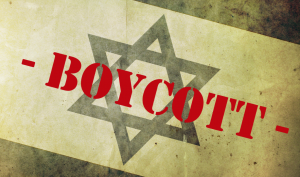
After Amnesty International launched its campaign calling on the world to “ban Israeli settlement goods” over alleged war crimes, Israel’s Finance Minister is poised to enact an anti-boycott law for first time, meaning Amnesty could lose tax status and other legal consequences under the law.
By Yair Altman
Finance Minister Moshe Kahlon has decided to use his authority under a 2011 anti-boycott law to punish Amnesty International, making it the first organization to face legal consequences under the provisions of the law.

Finance Minister Moshe Kahlon. – Photo: Wikimedia\dikla bassist shafrir
The anti-boycott law, officially known as the Prevention of Damage to the State of Israel through Boycott Law, allows the finance minister to impose civil sanctions on entities that promote or take part in an economic, cultural or academic boycott against an institution or person under Israeli control because of their “affiliation with Israel.” The minister may deny certain tax benefits from such an organization regardless of whether it takes an active role or simply pledges to take part in such activity.
Under the law, organizations may be also sued and could be forced to pay damages if their boycott-related action is proven to have caused harm. Kahlon plans to summon representatives from Amnesty International for a hearing, after which a final decision will be made on whether it should face sanctions. Amnesty stands to lose its special tax status in Israel, and as a result donations to the organizations would no longer be tax deductible, potentially hurting its fundraising operations.
In late July, Israel Hayom reported that Kahlon was considering enacting the law against the organization because of a new campaign it had launched called “Israel’s Occupation: 50 Years of Dispossession.” As part of the campaign, the organization called on the world to boycott products from Judea and Samaria and to impose an arms embargo on Israel because the Jewish state was supposedly committing war crimes in the settlements.
After the campaign surfaced in July, Kahlon was urged by MKs to take action. Kahlon did not say at the time whether he would target the organization, but said in a statement that the Finance Ministry “will use any and all means at its disposal, including denying tax benefits, against any organization that undermines the State of Israel or IDF soldiers.”
Following an extensive review, the Justice and Finance ministries recently concluded that the campaign was a clear violation of the Israel anti-boycott law. This conclusion was made in part based on content posted by Amnesty on its website and on social media.
For example, the recent campaign includes the following explanation on its website: “Call on your government now to ban Israeli settlement goods from entering your markets, and to stop companies based in your country operating in settlements or trading in their goods — and help put an end to the cycle of violations suffered by Palestinians living under Israel’s occupation. As well as illegally building settlement homes and infrastructure on Palestinian land, Israeli and international businesses in settlements have established a thriving economy to sustain their presence and expansion. This ‘settlement enterprise’ relies on unlawfully appropriated Palestinian resources, including land, water and minerals, to produce goods that are exported and sold for private profit. Hundreds of millions of dollars’ worth of settlement goods are exported internationally each year.”

Amnesty International Secretary General Salil Shetty. – Photo: Wikimedia/Henry Kellner
Amnesty International Secretary General Salil Shetty was quoted on the website as saying: “For decades, the world has stood by as Israel has destroyed Palestinians’ homes and plundered their land and natural resources for profit. While the Palestinian economy has been stunted by 50 years of abusive policies, a thriving multimillion-dollar settlement enterprise has been built out of the systematic oppression of the Palestinian population.
Fifty years on, merely condemning Israel’s settlement expansion is not enough. It’s time for states to take concrete international action to stop the financing of settlements which themselves flagrantly violate international law and constitute war crimes.”
Amnesty International refused to comment on Kahlon’s upcoming measure. In a statement on Monday it said: “We do not comment on rumors or leaks, we expect that on such important legal matters, the Finance Ministry should approach us directly through the proper channels, upon which we will issue a response.”
View original Israel Hayom publication at:
http://www.israelhayom.com/2017/09/12/in-first-amnesty-international-to-face-sanctions-under-boycott-law/






 Israeli New Shekel Exchange Rate
Israeli New Shekel Exchange Rate